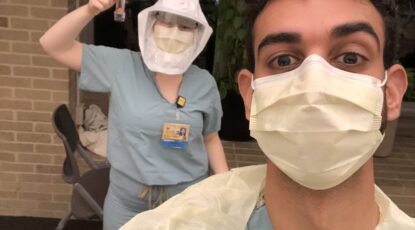Research News
-
Weisers establish diabetes institute
Regent Ron Weiser and his wife, Eileen, have committed $30 million to U-M for diabetes research and the development of life-changing therapies at Michigan Medicine.
-
U-M to launch second wave of research re-engagement
More than 700 researchers returned to the Ann Arbor campus in recent weeks and safely ramped up activity as part of the University’s pilot wave to re-engage research and scholarship.
-
Medical students drive development of new pandemic course
Students will explore various aspects of pandemic response using COVID-19 as a case study, from the history of pandemics; disaster response from the federal down to the local and institutional levels; and health inequities, among other topics.
-
Everyone vs. COVID-19: U-M scientists need public’s help
Signing up for U-M registry will make it easy for researchers to find sick, recovered, at-risk, and healthy people for dozens of studies. The goal is to understand, prevent, treat, and measure COVID-19’s effects on people and society.
-
Discovery may lead to better anti-obesity treatments
Researchers have unveiled the precise shape of a key player in human metabolism, which could open the door to better treatments for obesity and other metabolic disorders.
-
“It is now easier to hear Earth’s voice”
Michigan Stadium seismometer captures eerie quiet since COVID-19 lockdowns and stay-at-home orders were issued in March.
-
April 2020: Coronavirus and U-M
Global community rallies to raise funds, PPE, & more. Plus: Campus roundup of news, research, and resources in U-M’s fight against COVID-19.
-
The idea to ‘flatten the curve’
Decades of studying pandemics and how to curb them led a U-M physician-historian to coin a term the rest of us now use in daily conversation.
-
Feeling stressed? Take a ‘nature pill’
Spending just 20 minutes in nature — even if it’s simply gardening, doing yardwork or sitting quietly in the backyard — can significantly lower stress hormone levels.










